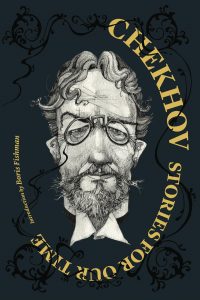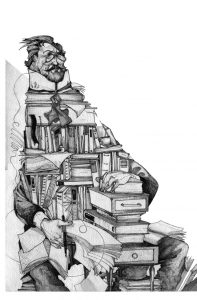by TARAS V. MIKHAILIUK

Anton Chekhov, Chekhov: Stories for Our Time. Translated from the Russian by Constance Garnett, Ilan Stavans, and Alexander Gurvets (Restless Books, 2018), pp. 344.
To review an edition of Anton Chekhov’s stories is an honor I could only have dreamed of, akin to shaking the hand of a favorite band member whose records you admired for years. I first encountered Chekhov in my Soviet-era middle school and was taken by the humor of stories like “The Man in the Case” included in this volume. Years later, as a young adult, I purchased for myself a copy of Chekhov’s selected stories, About Love, titled after another Chekhov classic that makes the present edition. To relive these stories once again now in the English language meant—as before—to read and savor them hungrily, from cover to cover.
Chekhov Stories for Our Time brings together stories that showcase Chekhov’s breadth and depth as a master craftsman of fiction. This edition boasts a variety of stories from frequently anthologized short classics like “Anna on the Neck” to the longer stories like “In the Ravine,” which reads more like a series of interwoven vignettes. Another story, “The Name-Day Party” evokes Virginia Woolf’s Mrs. Dalloway in miniature—events of a single party day viewed through the consciousness of a host. Prizing fragmentation rather than coherence in “In the Ravine,” Chekhov anticipates similar concerns of Modernist literature. As another departure from more traditional narration, “The Name-Day Party” reads like stream of consciousness, a narrative technique later practiced by Virginia Woolf and James Joyce.
This edition’s format is the first illustrated Chekhov I have seen. While original, whimsical, and evocative, Matt McCann’s drawings preceding each story seem too cartoonish, casting Chekhov as more of a satirist, though his stories expand significantly beyond those generic bounds. Framing them in this way feels reductionist and does disservice to Chekhov.
The introduction, written by the inimitable Boris Fishman, gives Chekhov his due. A Soviet immigrant and a man of letters himself, Fishman thoughtfully bridges several worlds: Chekhov and other Russian masters (Tolstoy, Dostoevsky), Chekhov the writer and Chekhov the person, Chekhov and twentieth-century authors, Chekhov and today’s Russia, Chekhov and post-2016 America. Chronology and a note on the text are two other major features of this edition that complete such a well-crafted contextualization of Chekhov for American readers.
Fishman’s contextual introduction and the translation led by Constance Garnett, Chekhov’s contemporary, create a roadmap across culture and time. They successfully bridge our life now and the world of Chekhov and his characters in the twilight years of imperial Russia. In this edition, we come to appreciate Chekhov “for our time” as we rediscover Chekhov before our time. Aided by Fishman’s insights, Garnett’s rendition of Chekhov restores for us a vantage point to approach Chekhov on the same terms as his first English-language readers.
This edition gives us a Chekhov unmediated by the subsequent cataclysms of the twentieth century, while indicating the imminent crumbling of the Western world, as well as Chekhov’s own. The world-wide war would break out only a decade later after Chekhov’s death in 1904, and the Bolshevik Revolution would succeed in Russia in 1917, unleashing a reign of terror. The questions these stories raise and ideas they challenge firmly embed themselves in the historical and cultural realignments of the early twentieth century. Chekhov’s ideas unfold for us in the exact same form they reached, preoccupied, and were shared by other giants of Modernism—Joyce, Woolf, and D. H. Lawrence. Reading Chekhov as an intellectual and cultural precursor of this era and its major figures is one rewarding path to interpreting the signs of the times. Similarly, we can grapple with the nuances of present concerns only as we enter the world and the language that began to expose them. In Garnett’s graceful English, Chekhov revives for us an early sight of the social and political fissures underlying our own crises and problems. If we let them, his stories might re-sharpen our vision now.

Chekhov questions individual worldviews that ignore the many facets of human nature and experience. Anna’s well-off husband in “Anna on the Neck” speaks in platitudes—“Everyone must have his duties!”—to protect his greed, careerism, and class privilege. In “Gooseberries,” Chekhov confronts shallow materialism and ambition for social advancement among impoverished middle-classmen through the subject of the story, Nikolai, who changes from a “poor timid clerk” to a “real landowner, a gentleman.” This transformation unfolds at a heavy price of greed, cruelty, and blindness toward his fellow humans. Happiness, comfort, and ease drive human actions in Chekhov’s day and our own, but grow out of the unhappiness—poverty, degradation, and social ills—of countless others.
A delusional, self-justifying outlook does not only belong to the extremes of ambition and privilege. In the meditative “The House with a Mezzanine,” the narrator preaches spiritual and intellectual self-improvement through leisurely pursuits of “religion, science, and art.” His counterpart in the story is an educated young woman, Lida, of reformist zeal and tireless efforts to improve the conditions of the local poor. We can sense reformist smugness in Lida’s gospel-like “we do what we can, and we are right.” However, her conviction that the “highest and holiest task for a civilized being is to serve his neighbors” forcefully confronts the artist’s utopian musings that, if only we strive to reach the uppermost spirituality, material ills like harsh manual labor, lack of rudimentary sustenance, poor healthcare, and illiteracy will disappear on their own.
Chekhov stories interrogate many of these problems through a voice that seems closest to the author’s—the character of Ivan Ivanovitch Tchimsha-Himalaisky. Appearing in three stories included in this collection, Ivan acts as the main storyteller and often mediates the stories’ major concerns with gender relations (“About Love”) and social identity and responsibility (“Gooseberries,” “The Man in the Case”). He readily admits his former arrogance and participation in an ideology that preserves the status quo. Ivan displays a profoundly sensitive social consciousness that transcends overzealous activism even as he embraces its basic Christian tenant, “be not weary in well-doing!” Happiness and ease inevitably breed moral complacency, a capitulation to things as they are. On the contrary, sensitivity to the suffering of others elevates human existence to a different plane, where “meaning and [an] object [in life] is not our happiness, but something greater and more rational.”
While this pronouncement comes close to a moral lesson, Chekhov’s observations resist the status of truths. His voice is not that of a sage elevated above the human fray, but that of a fellow human. His main characters are almost always virtuous and fallen at the same time, conflicted in their ideas, keen in their insights, and cartoonish in their often self-imposed folly. Chekhov resists taking himself too seriously. Only Chekhov could begin “About Love” with “At lunch . . . there were very nice pies, crayfish, and mutton cutlets.” Here the mundane dissipates any self-importance the reader might expect from a story with such a title. The story suggests such a plurality of ways to think about love that it feels almost deflating. Reasoning about love “must either, . . . start from what is highest, from what is more important than happiness and unhappiness, sin and virtue in their accepted meanings, or you must not reason at all.” Love defies reason and, like a Chekhov story, resists conclusions. Like life itself, Chekhov’s insights invite more questions than answers, with a lurking anxiety that life is but “bits of life fragments, that everything is accidental, that one could draw no conclusions from it.”
It is tempting to see today’s Western society as far removed from Chekhov’s socially regimented, largely agrarian imperial Russia nearing the brink of revolutionary crisis. Chekhov of his time is keenly attentive to the pronounced, almost pathological anxieties about shifting notions of equality, education, identity, justice, humanity, and love. As we follow his inquisitive explorations of these problems, similar urgent questions that we ask now—about social equality, selfhood, the old and the new—fall into deeper relief. Chekhov’s tentative insights point to what it might mean to preserve our humanity in the midst of seemingly insurmountable problems. In this sense, Chekhov is thoroughly at home in our world today, helping us regrow a consciousness more sensitive to the same pressing problems and fears that, despite their many mutations, persist in own day and time. Also a medic by profession, Chekhov recovers for us a multitude of possibilities how these new perspectives might develop: “as the doctors say, …individualize each case.” Standing at the threshold of our own momentous changes over a century later, we should try for ourselves a Chekhov insight—move forward, but tread carefully, taking one probing step at a time.

